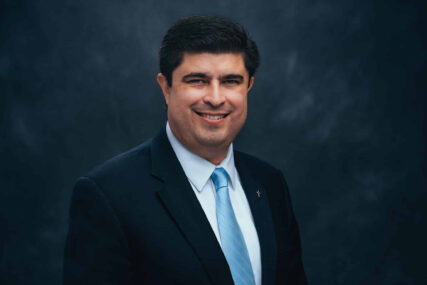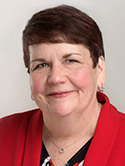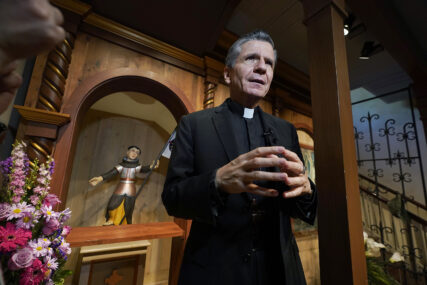(RNS) — As news of the mass shooting at a welcome-back Mass for the Annunciation Catholic School in Minneapolis spread across the country on Wednesday (Aug. 27), Catholic educators and church leaders sprang into action, reinforcing safety protocols and consoling students, even as they worked to process their own emotions about an unprecedented tragedy in which two children were killed and an additional 18 people were injured.
While many school leaders have become resigned to the necessity of preparing for potential school shootings, it was shocking to Catholics across the country to learn of an attack as students were gathered for worship.
Paul Escala, superintendent of the Archdiocese of Los Angeles’ more than 250 Catholic schools, said school leaders “oftentimes assume that it’s going to be someone inside the school campus coming in through corridors.” This case “was unimaginable,” he said, “that you have an active shooter beginning their shooting on the outside of the church through the glass, which was low and close to the pews.”

Paul Escala, senior director and superintendent of Catholic schools for the Los Angeles Diocese. Photo courtesy of Los Angeles Diocese
The unaccustomed situation of a school shooting occurring at a church has prompted the archdioceses of Los Angeles and Chicago to reinforce school safety plans to ensure their planning covers the time students spend at parish churches.
Karen Rebhan-Csuk, deputy superintendent of school support, said that the Archdiocese of Chicago’s more than 150 schools will now be practicing active shooter drills in churches.
“We’ve been very explicit with our schools and our churches that they need to now consider, if they hadn’t before, the sanctuary as an area that could also be at risk,” said Escala.
Both Escala and Rebhan-Csuk said their safety teams have been in contact with the FBI. Rebhan-Csuk added that their leadership is also learning from the Minneapolis police department.
Escala said Catholic schools are at an escalated threat level right now because of the potential for copycat attacks. “We always considered the possibility that this might have been directed at our faith and not necessarily just the (Annunciation) school.”
Despite security measures such as “cameras, security guards, door protection, window protection,” Escala said “this darkness finds its way in.” The superintendent said, “Sadly, people will find a way if they are determined.”
In Chicago, Rebhan-Csuk said school officials are looking for opportunities to improve their standardized emergency operation plan, which was developed this June at a symposium run jointly by the Department of Homeland Security and Illinois police and replaced plans that the archdiocese’s schools had developed on their own.
Learning about the shooting at Annunciation, even with all of the sadness that has brought, has reinforced the importance of safety plans because it seems like the school’s basic safety steps, such as locking the church’s doors, likely saved lives, Rebhan-Csuk said.

Karen Rebhan-Csuk, deputy superintendent for school support at the Archdiocese of Chicago. Courtesy of Archdiocese of Chicago
But even as they tweaked safety plans, Catholic schools were also working to support students and staff by gathering in prayer.
“ We can worship with due care and safety, but we will worship nonetheless because we will not allow anyone to take that away from us, and that is where we seek our power, our refuge and our security,” said Escala. “Fear is not an option.”
The LA schools superintendent called the shooting an “ attempt to silence our prayer, to silence our faith, to silence our children,” but he said he was determined that Catholics “will fill the void of darkness and loss with the light of love and compassion,” including for the shooter.
“ We are going to do a better job of reaching out to those who may have been hurt for whatever reason, may have lost their faith and their ability to reconcile the pain that they may have in their heart,” Escala said, wondering aloud what the shooter might have been going through.
In focusing on students’ psychological needs, Rebhan-Csuk said Chicago Catholic schools have particularly leaned on the National Association of School Psychologists when working to speak with children about gun violence in developmentally appropriate ways. They also have a mental health support line available that is staffed by a social worker and the archdiocese’s director of social-emotional learning, in addition to the counselors at many schools.
“ The social-emotional support is so important when students are in trouble or students are hurting,” said Rebhan-Csuk.
San Antonio Archbishop Gustavo García-Siller, who witnessed a similar aftermath in Uvalde, told RNS he “screamed spontaneously” when he heard the news from Minnesota. After the May 2022 shooting at Robb Elementary School, in his diocese, García-Siller immediately provided pastoral care, visiting students in the hospital and consoling parents and the children of a slain teacher, and held nightly Masses.
But the impacts on the Annunciation community will likely be long-lasting, he said, as they have been in Uvalde, where Teresian sisters still make daily visits throughout the community. A counseling center onsite at the parish opened last fall.
But García-Siller said Texas political leaders still have not fulfilled “the basic needs” of Uvalde’s low-income community, including for health care and psychological support. “It’s like nothing happened, even though we remember,” he said. “ To remember them on the anniversary, that’s nice, but it’s a token. They need to see changes in their place, the quality of life.”

Archbishop Gustavo García-Siller speaks at Mission San Juan Capistrano, May 4, 2021, in San Antonio. (AP Photo/Eric Gay)
The San Antonio archbishop thinks it’s possible that many in the Annunciation community will be too afraid to go back to the church building, just as some students felt about Robb Elementary. He emphasized the importance of prayer right now to prevent people from losing “their faith in God, in community, in themselves.”
He has sent Archbishop Bernard Hebda a letter expressing his sympathy. When asked about his advice for the Twin Cities’ archbishop, García-Siller, expressing admiration for Hebda’s leadership skills, said that, in his experience, being present, listening, expressing the church’s support and connecting victims to resources was most helpful in Uvalde.
García-Siller was just one of several Catholic bishops to renew his calls for gun control measures in response to the Annunciation shooting. “ We cannot just let these stories continue piling up,” he said. “People are being killed all ages and all over.” The U.S. must address hatred and division, he added, saying, “ We need to be more careful what we say, how we express ourselves, how we build bridges, how we promote and foster pieces of peace and common tranquility.”
Wednesday’s shooting at Annunciation came one day after another shooting outside Cristo Rey Jesuit High School, also in Minneapolis, where a man died. Local officials do not believe the two shootings are linked and have not said that anyone related to the school was involved or targeted by the shooting.
The Archdiocese of St. Paul and Minneapolis did not make a school official available for an interview, and the Rev. Thomas Bambrick, the director of Jesuit mission and identity at Cristo Rey, said he was declining interviews and “focusing on supporting our school community during this time.”
In Los Angeles, Escala said he believed better relationships could help protect the community from violence. “ We have the power to overcome these incredibly devastating moments if we are willing to make the sacrifices necessary to put aside our own personal needs, to truly engage one another in dialogue and resolution in conflict,” he said.
As a leader, he underlined the value of listening. “People need to cathartically share their feelings,” he said. “ We tend in institutional leadership to assume the defensive position that we need to have an answer for everything, and sometimes there are no answers.”
That listening draws on the Catholic church’s theological focus on synodality, or dialogue and walking together. By focusing on synodality and the Jubilee year, Escala said, Catholics can “take this moment, that is indeed horrible, and turn it into a moment of resurrection.”







